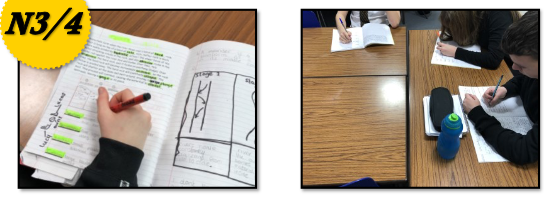Geography (N3/4)
What will I learn?
In Geography we study how natural and man-made environments around us have changed through time. Students will also acquire a new perspective on the biggest challenges facing our global society today.
Topics in the National course include: how the landscape is shaped by ice, rivers and waves; weather and climate; land use conflicts and management; urban issues (towns and cities); changes in farming around the world; changes in population; global health and global warming.
How will I learn?
Learning in National Geography involves a range of methods and approaches including making notes from presentations, reading textbooks, online research, simulation games and role playing tasks, group-work and outdoor fieldwork.
How will I be assessed?
Students following the National 3 course will be assessed on a unit – by – unit basis or by continuous assessment. These assessments will be on a pass / fail basis within school, but the SQA will moderate and verify marks.
Students following the National 4 course will be assessed on a unit – by – unit basis or by continuous assessment. These assessments will be on a pass / fail basis within school, but the SQA will moderate and verify marks. In addition to unit or continuous assessment students will also complete an Added Value Unit, based on fieldwork, which must be passed to gain the full qualification.
Career Opportunities
At its core, Geography is an interdisciplinary subject, meaning it connects different parts of many different subjects. Therefore, the skills gained from studying Geography are broad and diverse. The possible careers available to a student of Geography are equally broad and diverse. They might include careers like Environmental Consultant, Geologist, Renewable Energy Expert, University Lecturer, Journalist, Land Surveyor or Volcanologist, to name but a few.
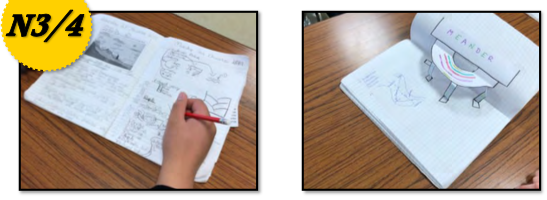
Geography (N5)
What will I learn?
In Geography we study how natural and man-made environments around us have changed through time. Students will also acquire a new perspective on the biggest challenges facing our global society today.
Topics in the National course can be categorised into Physical Environments, Human Environments and Global Issues, and include: how the landscape is shaped by ice, rivers and waves; weather and climate; land use conflicts and management; urban issues (towns and cities); changes in farming around the world; changes in population; global health and global warming.
How will I learn?
Learning in National Geography involves a range of methods and approaches including making notes from presentations, reading textbooks, online research, simulation games and role playing tasks, group-work and outdoor fieldwork. Some learning will also focus on exam revision techniques and answering typical past paper questions.
How will I be assessed?
Regular internal assessments will take place throughout the year to allow staff to monitor progress at this level. These will be marked using standardised marking schemes supplied by the SQA as appropriate.
National 5 Geography students will complete an external examination set by the SQA. This exam will assess pupil’s knowledge, understanding andgeographical skills, and is worth 80% of the final grade. The exam lasts 2 hours 15 minutes. Students will also carry out a research assignment, worth 20% of their final grade.
Career Opportunities
At its core, Geography is an interdisciplinary subject, meaning it connects different parts of many different subjects. Therefore, the skills gained from studying Geography are broad and diverse. These include skills related to basic map reading and orientation, persuasive writing, numeracy, creating and annotating visual information, working in a team and fieldwork. The possible careers available to a student of Geography are equally broad and diverse. They might include careers like Environmental Consultant, Geologist, Renewable Energy Expert, University Lecturer, Journalist, Land Surveyor and Volcanologist, to name but a few.
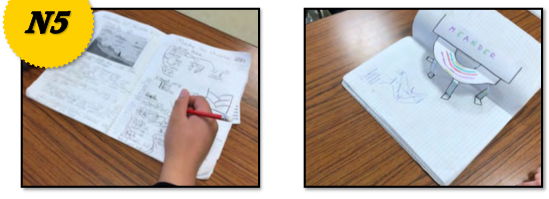
History (N4/5)
What will I learn?
The National level course will develop knowledge and understanding across Scottish, British and European and World contexts.
- Migration and Empire, 1830–1939: Immigration to Scotland, Immigrant Experiences, Scottish Emigration and Scots Abroad.
- The Atlantic Slave Trade 1770-1807: The Triangular Trade, Britain and the Caribbean, the captives experience, slave resistance and the abolitionist campaigns.
- Free at Last? Civil Rights in the USA, 1918-1968: The ‘Open Door’ policy and immigration, ‘Separate but Equal’, Civil Rights campaigns to 1968 and the Ghettos and black American radicalism.
How will I learn?
Pupils will develop a better understanding of our nation’s past, and will more fully comprehend its part in global changes. Using a range of teaching strategies including; ICT, primary and secondary sources and class discussion, they will become more confident in:
- selecting and interpreting information from a variety of historical sources
- building knowledge and understanding of the factors contributing to historical events
- forming views on the significance of the causes/ consequences of historical events
- forming their own judgements on the importance of historical events, taking historians opinions in to consideration
How will I be assessed?
At National 4 students need to pass four units, one from each of the core units, and an added value unit which is in the form of a research project.
At National 5 there are two components.
- The question paper assesses knowledge and understanding as well as skills and is worth 80% of the final grade.
- The assignment is a research project, carried out over several weeks and written up under exam conditions. This project makes up the final 20% of the grade.
Career Opportunities
Careers paths in History, Politics, Journalism, Teaching and other related disciplines could be considered.
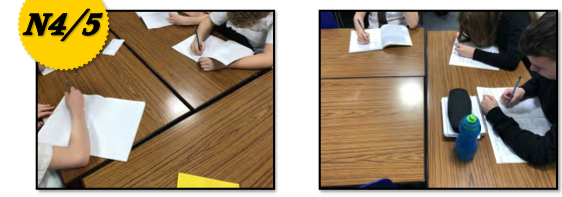
Modern Studies (N4/5)
What will I learn?
Modern Studies courses have three units:
- Democracy in Scotland (Scottish Parliament,political parties, voting systems, role of the First Minister and citizens influence in politics)
- Social Issues (crime, the police and the courts, the prison system)
- International Issues (America – Political Structure, political representation, Gun Laws, Social inequalities and Government action)
How will I learn?
Learning in Modern Studies involves a range of methods and approaches including regular discussions of current affairs, making notes from presentations, reading resource sheets, online- research, analysing sources of evidence and group presentation tasks.
Students are expected to gain knowledge of current issues but are also asked to evaluate and draw conclusions from new information provided to them.
How will I be assessed?
- National 4 involves four pass/fail units which are internally assessed. One of these is a ICT project on a topic chosen by the student.
- National 5 involves a written assignment (20%) and a final exam (80%)
Career Opportunities
Modern Studies provides a chance to learn about modern UK life. The insights gained are of considerable value in a wide range of careers including online and broadcast media, publicity, social work, law and law enforcement, politics and journalism.
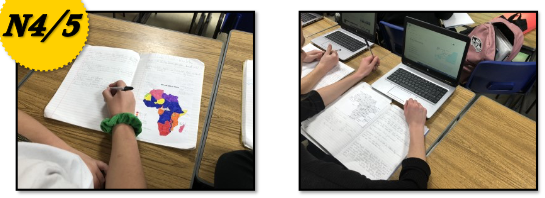
Religious, Moral and Philosophical Studies (N4/5)
What will I learn?
Islam
You will learn what Muslims believe about God, humans, Muhammad, life after death and how you should live your life. Also you will find out about Muslim practices, ceremonies and sacred scriptures.
Morality, medicine and the human body
You will consider the questions:
When does life being? Is life a sacred gift? Should euthanasia be legal? Is it right to use human embryos for research?
Religious and Philosophical Questions
In this unit you will investigate the question of the existence of God by considering the Cosmological and Teleological arguments.
How will I learn?
Students will use textbooks, class booklets and take part in discussion. A large part of learning involves the use of religious and non-religious viewpoints from video and internet.
You will:
Gain knowledge and understanding and develop your ability to explain and comment on the meaning of sources relating to Islam.
Investigate a variety of views including the religious beliefs of Christians and Muslims, and a non-religious, utilitarian view. You will develop skills to explain and express reasoned views.
Develop skills to analyse religious and philosophical questions, and the different views people have about them.
How will I be assessed?
At National 4 you need to pass four units, one on each of the three topics mentioned above and an added value unit.
At National 5 the qualification is graded A to D and there are two components:
Question Paper
This assesses your ability to retain and combine knowledge and understanding and skills from across the course. This question paper will have 80 marks and is worth 80& of the total mark.
Assignment
This assesses your ability to apply skills, knowledge and understanding to a religious, moral or philosophical issue of your choice. The assignment will have 20 marks and is worth 20% of the total mark.
Career Opportunities
Many of our students have gone on to do a wide variety of jobs. It is a benefit to anyone working with the general public. Some have trained to be philosophy or RMPS teachers whilst others have gone into the medical profession or law. A large number of our students go into careers involving, caring professions, the media, the armed forces, psychology and primary school teaching. RMPS qualifications are accepted by all colleges and universities.
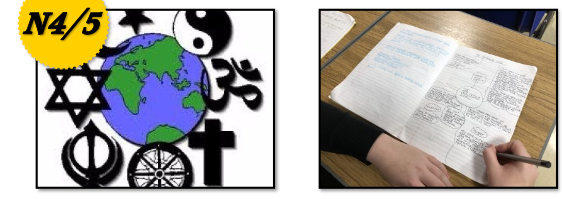
Social Subjects (N3/4)
What will I learn?
Pupils studying National Social Subjects will be given the opportunity to achieved two qualifications if they successfully complete this course. National Social Subjects is a flexible and inter-disciplinary course offering students the opportunity to study themes, issues and topics of interest and relevance to them. The course develops a range of skills as well as knowledge and understanding of people and society from the social studies (Geography, History and Modern Studies) and Religious and Moral Education.
Pupils will undertake two qualifications.
People and Society – Here pupils will study three units;
- Investigating Skills
- Comparing and Contrasting
- Making Decisions
The second qualification will be a study of one Social Subject.
How will I learn?
A variety of resources will be used within the classroom to engage learners. This includes a variety of media sources, ICT, booklets and text. Pupils will also be encouraged to discuss key content to help them become more confident in interpreting information, building up knowledge and developing investigation skills.
How will I be assessed?
National 3 – Pupils will be assessed on a unit – by – unit basis. Pupils must pass all unit assessments to achieve a National 3 award.
National 4 – Pupils will be assessed on a unit – by – unit basis. Pupils must pass all unit assessments to achieve a National 4 award. In addition, pupils will also complete an Added Value Unit which must be passed to gain the full qualification.
Career Opportunities
Social Subjects gives our students the opportunities to experience a range of different skills and experiences which can help students follow the career opportunities outlined in each individual Social Subjects page. This course would be perfect for students who are interested in different career paths from different Social Subjects.
